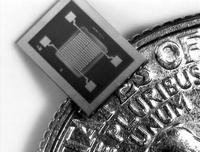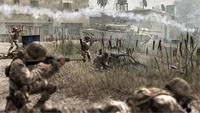-
New detectors for chemical, biological threats

In the late 1990s, Sandia scientists developed a simple-to-use handheld chemical detector for the military, the MicroChemLab. Ever since, Sandia has improved such microfluidics- and microelectromechanical (MEMS) systems-based instruments that identify chemicals based on gas chromatography, or GC, and resonator-style instruments such as surface acoustic wave (SAW) detectors. The lab’s researchers are building on this sensor work to invent tiny detectors that can sniff out everything from explosives and biotoxins to smuggled humans.
-
-
Worries grow about Syria’s biological weapons capabilities, intentions
The debates among experts in Western and Middle Eastern intelligence services and militaries about the use of chemical weapons by the Assad regime revolve around how many times Assad has used chemical weapons, not whether such weapons were used. Neighbors of Syria have become increasingly alarmed – and, in private, have expressed their anxiety in discussions with the United States – about another illicit Syrian WMD program: biological weapons. The readiness of the Assad regime to use one proscribed weapon – chemicals — has led to growing unease among Syria’s neighbors that the regime may not find it too difficult to violate other weapon-related taboos. Biological weapons could give the Assad regime an effective means of retaliation because, if the weapon is well-designed, the lethal contents would spread easily without leaving tell-tale signs about the origin of the attack – or even evidence that there has been an attack.
-
-
New systems improve voice recognition
Graduate students and researchers at the University of Texas Dallas have developed novel systems that can identify speaking voices despite conditions that can make it harder to make out a voice, such as whispering, speaking through various emotions, or talking with a stuffy nose.
-
-
Administration's Syria plan: limited operation with “downstream” effect
Three leading administration officials yesterday presented, in general detail, the plan of attack on Syria. The plan emphasizes the destruction of delivery vehicles – missiles, rockets, planes and their airfields, and artillery pieces – used in the delivery of chemical weapons. The three officials – Kerry, Hagel, and Dempsey — agreed that such an attack, even if its purpose would be to degrade the regime’s ability to deliver chemical weapons, would have “downstream” effect: these delivery vehicles also deliver conventional munitions, so their destruction would more generally degrade the regime’s ability to fight, thus making the battlefield between the regime and the rebels more level. The Senate Foreign Relations Committee is today drafting a new resolution which would permit up to ninety days of military action against the Syrian government and bar the deployment of U.S. combat troops in Syria but permit the deployment of a small rescue mission in the event of an emergency. The White House also would be required within thirty days of enactment of the resolution to send lawmakers a plan for a diplomatic solution to end the violence in Syria.
-
-
Fusion centers collect information on non-threatening groups

Since the 9/11 attacks, federal and state surveillance of nonviolent student groups, protest movements, and mosques has increased along with the growth of fusion centers. Fusion centers serve as the focal points for the receipt, analysis, gathering, and sharing of threat-related information. According to DHS, there are fifty-three primary fusion centers and twenty-five recognized fusion centers across the United States.
-
-
Police’s facial recognition program becomes a political issue in Ohio
Attorney General Mike DeWine of Ohio confirmed last week that local and state law enforcement have used facial recognition software since June of this year to match images of potential suspects and victims to pictures on the state’s drivers’ licenses and mug shots. The Democratic challenger for the Attorney General post faulted DeWine’s office for launching the program on 6 June without any public notice.
-
-
Security vs. privacy
Those who ask you to choose security or privacy and those who vote on security or privacy are making false choices. That’s like asking air or water? You need both to live. Maslow placed safety (of which security is a subset) as second only to food, water, sex, and sleep. As humans we crave safety. As individuals and societies, before we answer the question “security or privacy,” we first have to ask “security from whom or what?” and “privacy from whom and for whom?”
-
-
Top Five most awesome robots
In the last decade, robots have often been employed on the battlefields of Iraq and Afghanistan, usually to seek out hidden bombs. More and more of these the robots are now being adopted by first response agencies to help in search-and-rescue operations in the wake of disasters. The growing interest in – and usefulness of — robotics have also inspired a series of competitions and challenges, some of which are directed at high-school and college students, to encourage budding scientists to go into the field of robotics.
-
-
Lawmakers mull oversight of U.S. cyberattack capabilities and operations
There has not yet been a public discussion of U.S. offensive cyberattack capabilities — and of actual U.S. cyberattacks — and the subject had been classified until a few years ago. Even after the subject came more into the open, only the fact that the United States had the capability to initiate offensive cyberattacks was acknowledged. With the growing attention to cyber operations – both defensive and offensive — the question of oversight is set to follow.
-
-
Privacy board wants Feds to update security agencies’ operating rules
The independent Privacy and Civil Liberties Board says U.S. national security agencies are operating under outdated rules which should be revised to reflect advances in technology.The oversight board says that rules governing collection and retention of data about Americans need be revised to “appropriately capture both the evolution of technology and the roles and capabilities of the intelligence community since 9/11.”
-
-
Justice Department sues to block release of FirstNet-related information
A federal court in Des Moines, Iowa, accepted arguments by Justice Department lawyers to issue a temporary injunction to block the release by an Iowa Sherriff of e-mails pertaining to a public safety communication network. The Justice Department argued the release of e-mails could seriously impede plans for this single, interoperable network designed to resolve the communications problems that hampered responses to the 9/11 terrorist attacks and other disasters. FirstNet, to whose board Fitzgerald was appointed last year, was authorized by Congress in 2012 to develop and deploy the communications network and is housed in the Department of Commerce.
-
-
Kerry leaves no doubt: U.S. will attack Syria within days, no UN approval sought
In a speech today, Secretary of State John Kerry left no doubt that the Obama administration, within days at most, will launch a series of attacks against the Assad regime for attacking Syrian Sunni civilians with chemical weapons. The chemical attack – not the first one by the regime this year — killed 1,429 people, including 426 children. Kerry said punishing the offending regime was not only the right thing to do morally, but it is essential to protect U.S. national interest and the interests of U.S. allies. The administration has circulated a report, prepared by the U.S. and U.K. intelligence communities, detailing the evidence pointing to the Assad regime’ responsibility for the chemical attack. Kerry: we “make our own decisions on our own timelines, based on our own values and interests”
-
-
British Parliament vote complicates U.S. Syria plans (updated)
In a heavy defeat to Prime Minister David Cameron, the British Parliament voted against British military contribution to or involvement in an attack on Syria in response to the Assad regime’s use of chemical weapons last week. The vote is an embarrassing defeat for Cameron, and a major set-back for President Obama’s plan to put together a coalition of the willing to strike military targets in Syria. The parliamentary vote has no military significance, as the British contribution to the actual military operations would have been minimal at best. The U.K. vote, rather, is a political blow to the United States as it highlights on-going skepticism among Western publics – including U.S. public opinion — about yet another Western military involvement in the Middle East. The British vote is a blow to the United States more generally, as Britain has been the U.S. most loyal ally, and has taken part in every major U.S. military offensive in recent years.
-
-
U.S. military doubts purpose, efficacy of U.S. strike on Syria
The Obama administration’s plan to attack military targets in Syria is not greeted with enthusiasm by a U.S. military still carrying the scars of military involvement in Iraq and Afghanistan and facing deep budget cuts.Many in the military have reservations about a military action in Syria, with the main reservations concerning the potential unintended consequences of launching cruise missiles against Syria. Both supporters and opponents of a strike on Syria, though, agree on one thing: “Remember, with respect to policy choices concerning Syria, we are discussing degrees of bad and worse,” one officer said.
-
-
New analysis suggests war has not disappearing

While some researchers have claimed that war between nations is in decline – see, for example, Steven Pinker’s 2011 book The Better Angels of Our Nature: Why Violence Has Declined — a new analysis suggests we should not be too quick to celebrate a more peaceful world. New study finds that there is no clear trend indicating that nations are less eager to wage war. Conflict does appear to be less common than it had been in the past, but this is due more to an inability to fight than to an unwillingness to do so.
-
More headlines
The long view
Factories First: Winning the Drone War Before It Starts
Wars are won by factories before they are won on the battlefield,Martin C. Feldmann writes, noting that the United States lacks the manufacturing depth for the coming drone age. Rectifying this situation “will take far more than procurement tweaks,” Feldmann writes. “It demands a national-level, wartime-scale industrial mobilization.”
How Male Grievance Fuels Radicalization and Extremist Violence
Social extremism is evolving in reach and form. While traditional racial supremacy ideologies remain, contemporary movements are now often fueled by something more personal and emotionally resonant: male grievance.
The Surprising Reasons Floods and Other Disasters Are Deadlier at Night
It’s not just that it’s dark and people are asleep. Urban sprawl, confirmation bias, and other factors can play a role.
Why Flash Flood Warnings Will Continue to Go Unheeded
Experts say local education and community support are key to conveying risk.
